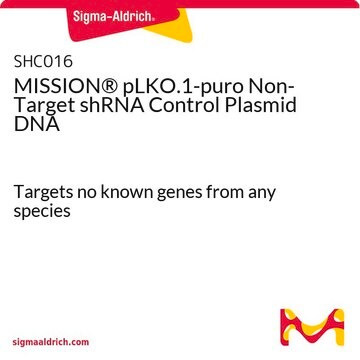SHC016V
MISSION® pLKO.1-puro Non-Target shRNA Control Transduction Particles
Targets no known genes from any species
Sinonimo/i:
MISSION®, MISSION® Control Transduction Particles, negative control, negative shRNA control, non-target control, non-target shRNA, non-target shRNA control, shRNA control
Scegli un formato
388,00 €
Scegli un formato
About This Item
388,00 €
Prodotti consigliati
Livello qualitativo
Nome Commerciale
MISSION®
Concentrazione
≥1x106 VP/ml (via p24 assay)
Condizioni di spedizione
dry ice
Temperatura di conservazione
−70°C
Cerchi prodotti simili? Visita Guida al confronto tra prodotti
Descrizione generale
To see more application data, protocols, vector maps visit sigma.com/shrna.
Applicazioni
Risultati analitici
Note legali
Raccomandato
Codice della classe di stoccaggio
12 - Non Combustible Liquids
Classe di pericolosità dell'acqua (WGK)
WGK 3
Punto d’infiammabilità (°F)
Not applicable
Punto d’infiammabilità (°C)
Not applicable
Scegli una delle versioni più recenti:
Certificati d'analisi (COA)
Non trovi la versione di tuo interesse?
Se hai bisogno di una versione specifica, puoi cercare il certificato tramite il numero di lotto.
Possiedi già questo prodotto?
I documenti relativi ai prodotti acquistati recentemente sono disponibili nell’Archivio dei documenti.
I clienti hanno visto anche
Filtri attivi
Il team dei nostri ricercatori vanta grande esperienza in tutte le aree della ricerca quali Life Science, scienza dei materiali, sintesi chimica, cromatografia, discipline analitiche, ecc..
Contatta l'Assistenza Tecnica.






